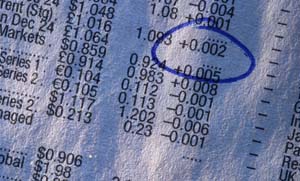The stock market might be nervous now due to the subprime loan mess, but Stuart Greenbaum, former dean of the Olin School of Business at Washington University in St. Louis, is bullish on the situation.
“Banks that don’t have a lot of bad paper in their portfolios are going to see the credit spreads widen out, and they’re going to end up making money as a result,” Greenbaum said. “The situation has created a buying opportunity, and we’re already seeing the reaction in the price of financial stocks, such as banks and insurance.”

Greenbaum said that the subprime loan problem is a bit of toxicity that has entered the food chain.
Although the toxicity is widespread and expansive at this point, the market is built to absorb a certain amount of default.
The reaction to the subprime loan issue is compounded by several factors: First, the market was at a historically high level; second, interest rates were low; and third, the yield curve was flat and credit spreads have been very narrow, reflecting historically low volatility.
“So the market is reacting to a somewhat exaggerated situation to begin with, and it has a particular vulnerability because credit spreads were narrow,” he said. “Volatility has been very low which has been driving the compressed interest margins. As a result, banks have been having trouble making money.”

Despite the circumstances, this is not a time to panic, Greenbaum said.
In fact, he anticipates interest margins to return to their historic levels.
“In general, the equity market is pretty conservatively priced, especially when compared to the bubble of 2000-2002, when stocks were trading at 80 or 90 times earnings,” Greenbaum said. “Bank stocks are paying as high as a 6 percent, well-protected dividend yield.
“I don’t see a huge amount of vulnerability in the capital market now,” he said. “I do think capital market volatility was extraordinarily low for the last two or three years, so some of what we’re seeing is a movement back to historical averages, even if the move has been somewhat disjointed.”
Greenbaum is available for live or taped interviews using Washington University’s free VYVX or ISDN lines. Contact Shula Neuman at sneuman@wustl.edu, (314) 935-5202 or Stuart Greenbaum at greenbaum@olin.wustl.edu, (314) 935-6344.